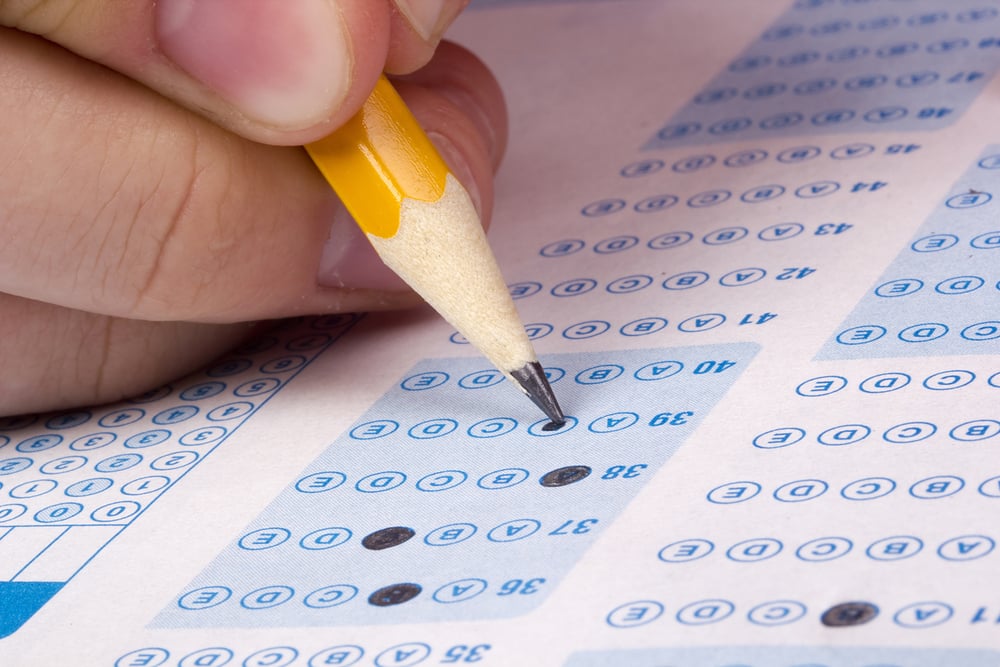In a recent research study (abstract only) of dyslexic students at college, the following strategies were mentioned: 1. Go to Lecture and Just Listen. It was common for students to be unable to listen and note-take at the same. Face-to-face lectures were preferred to recorded lectures because audio quality was sometimes bad, and some students need to see the teacher’s face and his or her gestures to fully comprehend what was being said. Request a Note-Taker Early. One student said at times a note-taker had to be requested several weeks in advance (!). Record Notes with the One Note or Audionote App. 2. Prepare for Lecture. For classes where teachers make Powerpoints available before lecture, download and print so notes can be written on them […]
[PREMIUM] TEST-TAKING: DYSLEXIA and MULTIPLE CHOICE
At the secondary and university level, many students with dyslexia may prefer short answer questions to multiple choice. There are many reasons why the multiple choice question format may not be a good estimator of a student’s knowledge. It is very common for the questions and choice answers to be ambiguous. From Biochemical Education: “Writing good multiple choice questions is hard, a fact not appreciated by all teachers and examiners. There is a tendency to use imprecise terms, and even when apparently precise terms such as always and never are used (for example in true/false type tests), it seems that not everyone agrees these are indeed absolutes….In a survey of medical examiners, Holsgrove and Elzubeir found that of 63 respondents, 51 considered that always means […]
[PREMIUM] Don’t Require COPYING From the Board
DON’T REQUIRE COPYING FROM THE BOARD Dr. Kirkby: “Copying text…is psychologically complex. It involves a series of sequential visual and cognitive processes, which must be co-ordinated: these include visual encoding, mental representation, an written production.” Long after students have begun to crack the code of reading, note-taking and copying from the board remain very difficult if not impossible for some students. Note-taking from lecture adds the additional challenging of listening to words, translating them into a visual representation, then retrieving these images and motor sequences to get them down on a page. Moderate to severe dysgraphia is not uncommon among dyslexic students. For these students, not only will copying from the board be impossible, but also significant modifications (decreased written work) and accommodations (extended time, […]
Dyslexia: The Twenty-Something Years [PREMIUM]
“These are the years when it will be easiest to start the lives we want. And no matter what we do, the twenties are an inflection point- the great reorganization – a time when the experiences we have disproportionately influence the adult lives we will lead.” – Meg Jay, author of The Defining Decade “Life for emerging adults is vastly different today than it was for their counterparts even a generation ago. Young people are waiting longer to marry, to have children, and to choose a career direction. As a result, they enjoy more freedom, opportunities, and personal growth than ever before. But the transition to adulthood is also more complex, disjointed, and confusing. ” – Christian Smith, lead author of Lost in Transition Many ‘experts’ have […]
DROPPING OUT BECAUSE OF FOREIGN LANGUAGE [Premium]
At Harvard University in the 1970s, a clinical psychologist made a startling discovery. Intending to study the emotional problems that caused students at one of the world’s elite universities to drop out of school to drop out, he found out instead that the most common reason students dropped out of their degree programs was that they were unable to satisfy Harvard’s foreign language requirement. “Dinklage described three groups of students who were otherwise, bright, gifted, and highly motivated, but who remained unsuccessful in the foreign language classroom. He reported that these students were not helped by merely improving study habits or by adjusting to postsecondary demands.” The 1st group of students demonstrated problems in written language that were most apparent in “the student’s reading […]
WHEN A UNIVERSITY IS DYSLEXIA-UNFRIENDLY [Premium]
Despite recent advances in dyslexia-friendly policies and statements in K-12 and higher education, reports of dyslexia-unfriendly and discriminatory practices are more common than anyone would like to mention. At the university level, rarely is there any education for faculty and staff about the needs of dyslexic and LD students on campus, so it should not be surprising that many professors will not understand why accommodations are necessary for dyslexic students. They may actively discourage students from obtaining such accommodations although it is against federal law. As we have recently reported, US Department of Justice regulations requires that private colleges give “Considerable weight to the documentation of past accommodations, modifications, or auxiliary aids or services received in similar situations” and not require additional burdensome re-testing. […]
Improved College Board Guidelines for Test Accommodations
New from the College Board: "Beginning January 1, 2017, the vast majority of students who are approved for and using testing accommodations at their school through a current Individualized Education Program (IEP) or 504 Plan will have those same accommodations...
Teaching Chemistry to Students with Dyslexia [Premium]
Although High School Chemistry is required for many of the top 4 year liberal arts colleges and college Chemistry is a necessary requirement for many majors and careers that many dyslexic students excel in like engineering or medicine, there is a surprising lack of resources available to students having their first encounter with chemistry – and that may make things tricky, especially if they’re also juggling a full load of classes. For Premium subscribers, here are a few tips and strategies for surviving and even thriving at chemistry. Chemistry can be a field that dyslexics do extremely well at because they can visualize, rotating molecules in space, and picture their interactions and energy transformations. The main challenge is often at the beginning – when all the […]
[Premium] Thriving: Pick Classes Like a Pro
Whether it’s high school or college, picking your classes can make a tremendous difference in your school experience and grades. Many of the general strategies given to college freshman often apply, but some additional tips can be helpful if you’re dyslexic.
Divide and Conquer: Working Memory Hacks [Premium]
“Divida et Impera.” – Julius Caesar There’s an old military strategy of Divide and Conquer that’s been in operation even before Julius Caesar’s Divida et Impera (Divide and Rule), and it turns out divide and conquer can be helpful if you’re dyslexic too. Recently, we were asked by a professional colleague about the most common cognitive pattern we see in dyslexic individuals. Verbal reasoning and not uncommonly spatial reasoning are high, but working memory and processing speed are slow. How could it be, she asked that fund of knowledge and reasoning ability are so high though working memory is much lower or even quite low? The reason there is no tight connection between these cognitive groups is that working memory is not an index of total memory (for […]
Karina Eide Memorial Scholarship 2016 Winners – Meet Brian and Charles
Here are two more winners of Dyslexic Advantage's Karina Eide Memorial Scholarship 2016. Brian is an undergraduate at Cornell University who unbeknownst to us, we had been acquainted with because of his excellent assistive technology blog,...
Latest Research: Advances in our Understanding of Dyslexia, ADHD, and Giftedness [Premium]
It’s long been known that Dyslexia and ADD / ADHD have high rates of overlaps or “co-morbidities”. Dyslexia and ADHD co-occur 30-50% of the time (Germano, 2010) and only 40% of children with dyslexia and 20% of children with ADD/ADHD have it in isolation (Wilcutt and Pennington, 2000). Science has progressed on many fronts over the past 5 years, and both attention and dyslexia are now known to be much more complex than originally suspected. It has long been known that dyslexia is associated with attention and working memory differences, and that reading, writing, and spelling difficulties are higher among children identified as having ADHD. Both Dyslexia and ADD / ADHD are associated with slower processing speeds and both seem to be connected with the […]

![Positive Strategies for College [PREMIUM]](https://www.dyslexicadvantage.org/wp-content/uploads/2018/01/Screen-Shot-2019-08-30-at-1.03.04-PM.jpg)
![[PREMIUM] TEST-TAKING: DYSLEXIA and MULTIPLE CHOICE](https://www.dyslexicadvantage.org/wp-content/uploads/2017/12/shutterstock_1153156547.jpg)
![[PREMIUM] Don’t Require COPYING From the Board](https://www.dyslexicadvantage.org/wp-content/uploads/2017/12/Screen-Shot-2019-08-31-at-2.15.03-PM.jpg)
![Dyslexia: The Twenty-Something Years [PREMIUM]](https://www.dyslexicadvantage.org/wp-content/uploads/2017/07/Screen-Shot-2019-09-01-at-8.40.01-AM.jpg)
![DROPPING OUT BECAUSE OF FOREIGN LANGUAGE [Premium]](https://www.dyslexicadvantage.org/wp-content/uploads/2017/02/r1-18.png)
![WHEN A UNIVERSITY IS DYSLEXIA-UNFRIENDLY [Premium]](https://www.dyslexicadvantage.org/wp-content/uploads/2017/01/element5-digital-jCIMcOpFHig-unsplash-scaled.jpg)

![Teaching Chemistry to Students with Dyslexia [Premium]](https://www.dyslexicadvantage.org/wp-content/uploads/2016/09/Screen-Shot-2019-09-09-at-10.55.40-AM.jpg)
![[Premium] Thriving: Pick Classes Like a Pro](https://www.dyslexicadvantage.org/wp-content/uploads/2016/08/choose-classes-dyslexia.jpg)
![Divide and Conquer: Working Memory Hacks [Premium]](https://www.dyslexicadvantage.org/wp-content/uploads/2016/07/shutterstock_136697417.jpg)

![Latest Research: Advances in our Understanding of Dyslexia, ADHD, and Giftedness [Premium]](https://www.dyslexicadvantage.org/wp-content/uploads/2016/04/brain-pixabay.jpg)













